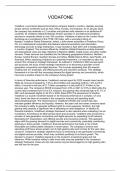VODAFONE
Vodafone, a prominent telecommunications company based in London, operates services
across various continents such as Asia, Africa, Europe, and Oceania. As of January 2023,
the company has networks in 21 countries and partners with networks in an additional 47
countries. Its Vodafone Global Enterprise division provides IT and telecommunications
services to corporate clients in over 150 countries. Vodafone is listed on the London Stock
Exchange as a constituent of the FTSE 100 Index, with a secondary listing on
Nasdaq. Vodafone Global Enterprise Limited, a fully-owned subsidiary of Vodafone Group
Plc, is a multinational corporation that delivers telecommunications and information
technology services to large enterprises. It was founded in April 2007 and is headquartered
in London, England. The services offered by Vodafone Global Enterprise include domestic
and international voice and data, Machine to Machine (M2M), mobile email, and other mobile
services. These services are classified into the following geographical divisions: Northern
Europe, Central Europe, Southern Europe and Africa, Middle East & Africa, Asia Pacific, and
Americas. When assessing Vodafone as a potential investment, it is important to take into
account the company's strategic framework. As outlined in Vodafone's 2022 annual report
and accounts, the focus of their strategic framework is on becoming a provider of next-
generation connectivity and digital services. This involves expanding their 5G network,
creating new IoT proposals, and offering security and insurance products. This strategic
framework is in line with the increasing demand for digital services and connectivity, which
may have a positive impact on the company's future growth.
In terms of financial performance, Vodafone's annual report for 2022 reveals mixed results.
While its revenue increased by 1.3% to £44.9 billion and operating profit by 1.9% to £5.8
billion, it incurred a net loss of £1.7 billion compared to a net profit of £1.4 billion in the
previous year. The company's ROCE increased from 4.8% in 2021 to 5.5% in 2022 while the
current ratio increased from 0.8 to 0.9; however, the gearing ratio remained high at 47.1% in
2021 and decreased slightly to 44.5% in 2022. Basic EPS The assessment of whether
Vodafone is a sound investment based on its financial performance is complex. On one
hand, there has been an increase in the company's revenue and operating profit,
demonstrating growth. The improvement in Vodafone's ROCE and current ratio also
indicates greater efficiency and liquidity. However, the year's net loss raises concerns about
the company's ability to generate sufficient profit to cover expenses. Similarly, the high
gearing ratio presents a significant risk of defaulting on debt obligations. In addition to
financial indicators, Vodafone's strategic framework is also relevant when evaluating it as an
investment. According to its 2022 annual report and accounts, Vodafone aims to become a
provider of new-generation connectivity and digital services by expanding its 5G network,
developing IoT propositions, and offering security and insurance products. This approach
aligns with the growing demand for digital services and connectivity, potentially contributing
positively to future growth. Vodafone’s financial performance has been a mix of both
favourable and unfavourable indicators in recent years. The company's revenue and
operating profit have shown growth, but its high gearing ratio and net loss for the year raise
concerns. Vodafone's strategic objectives focus on becoming a new generation connectivity
and digital services provider, which may contribute positively to its future growth. The
decision to invest in Vodafone depends on the investor's investment goals and risk
tolerance. While investors willing to take more risks may see potential in the company's
strategic framework, those who are risk-averse may be discouraged by its high gearing ratio
and net loss for the year.




